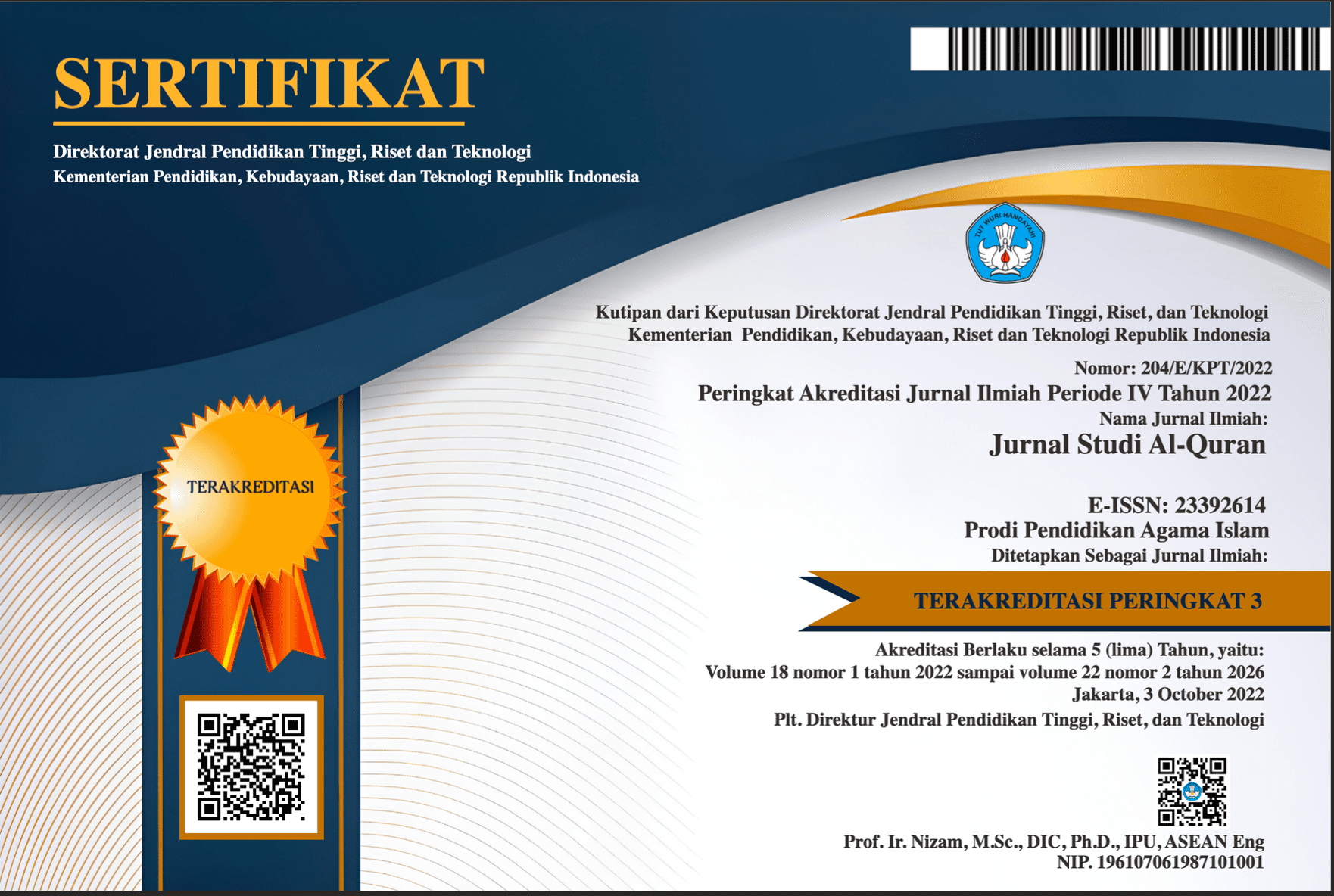Islamic Education on Science, Peace, and Development in Thought of Said Nursi
English
DOI:
https://doi.org/10.21009/JSQ.014.2.01Keywords:
Islamic education, Development education, Synchronous, ScienceAbstract
Bediüzzaman Said Nursi desired to fit in the divine and modern knowledge with the resolution to authenticate the facts for assurance. To overcome many obstacles and continued in the teaching of Islam requires education to inspire learning approach across all societies. Development is more effective when it is combined with Character and religious education. Therefore he thrived to release the Islamic world from the dungeons of ignorance and poverty; with vision and progressive action, believed that a greater demand on learning could position a society into a very strong and higher position. He had a great inclusiveness quotient and promoted innovation to be brought into the Islamic Society, by appreciating the good elsewhere. Improved groundwork in science adequately requires extensive work so as to surge up the quality, professionalization, latent skilling and advance learning in people, so that they rise high and value effort to be considerably effective than as it was earlier. Without any Islamic connect learning is assumed to have been only invented, but of no real use.
Keywords: Islamic education, Development education, Synchronous, Science
References
Nisanci, Zubeyir, (2015), The Dialectics of Secularism and Revivalism in Turkey: The Case of Said Nursi, Dissertations. Pp 532. http://ecommons.luc.edu/luc_diss/1482.
M. Fethullah Gülen (2004), Towards a global civilization of love and tolerance, Çaðlayan A.S. Izmir, Turkey, ISBN 1-932099-68-9, Pp 291.
Jirout, J., & Klahr, D. (2012). Children’s scientific curiosity: In search of an operational definition of an elusive concept. Developmental Review, 32, Pages 125-160.
Bradley J. Morris, Steve Croker, Amy M. Masnick and Corinne Zimmerman (2012), The Emergence of Scientific Reasoning, INTECH, http://dx.doi.org/10.5772/53885, pp. 22
Mohamed Mohamed Toba Said, Barbara Sawicka, Krishnan Umachandran (2017), Innovative cultural inclusiveness in Medical treatments (learning from the past), Chapter X, pp. 8.
William Maurer, Frances Karamouzis, Jorge Lopez, Robert A. Handler, Andrew Frank, Elise Olding, Angela McIntyre, Julie Short, Michael Shanler, Ruby Jivan, Bryan Taylor, Jennifer Polk, Jake Sorofman, Alexander Drobik, Earl Perkins, Kelsie Welch, (2014), Top 10 Strategic predictions for 2015 and beyond: Digital business is driving 'Big Change',G00269904, GARTNER, Corporate Headquarters, 56 Top Gallant Road, Stamford, CT 06902-7700, Pages 29.
Sawhney, M. & Kotler, P., 2001, Marketing in the age of Information democracy, edited book, Kellogg on Marketing, John Wiley, USA, pp 386-404.
Arunava Narayan Mukherjee , Sudipto Bhattacharyya, Risika Bera, (2014), Role of Information Technology in Human Resource Management of SME: A Study on the use of Applicant Tracking System, IBMRD's Journal of Management and Research, Print ISSN: 2277-7830, Online ISSN: 2348-5922, Volume-3, Issue-1, March 2014, pp. 22.
Nielsen (2015), Global generational lifestyles, How We Live, Eat, Play, Work and Save for Our Futures,
https://www.nielsen.com/content/dam/nielsenglobal/eu/docs/pdf/Global%20Generational%20Lifestyles%20Report%20FINAL.PDF.
Mohammad Firdaus Mohammad Hatta, Mawil Izzi Dien, Saadiah Mohamad (2014), Examining the Impact of Islamic Products on Debt Expansion and Inflationary Pressure, international Interdisciplinary Journal of Scientific Research Vol. 1 No. 2, November, 2014. pp. 16.
Mervyn K. Lewis (2015), Models of Islamic Banking:The Role of Debt and Equity Contracts, JKAU: Islamic Econ., Vol. 28 No. 1, pp: 163-177, (2015A.D./1436A.H.), DOI: 10.4197 / Islec. 28-1.6163.
Kamaruzzaman Bustamam-Ahmad, Patrick Jory (2011), Islamic studies and Islamic education in contemporary Southeast Asia, Yayasan Ilmuwan, ISBN 978-983-44372-3-7 (pbk.) pp. 283.
Camille B. Kandiko, Matt Mawer (2013), Student Expectations and Perceptions of Higher Education, A STUDY OF UK HIGHER EDUCATION Commissioned by the Quality Assurance Agency, pp. 82
Sabri, D. (2011). What's wrong with ‘the student experience’? Discourse: Studies in the Cultural Politics of Education 32(5): 657â€667.
Michael Tomlinson (2016), Student perceptions of themselves as ‘consumers’ of higher education, British Journal of Sociology of Education, Volume 38, Issue 4, pp. 450 -467.
Shaza Khan (2016), Evaluating a Saturday Islamic School: Learning from the students through a participatory needs-assessment, pp. 13.
Waqar-un-Nisa Faizi, Anila Fatima Shakil, Sajjad Hayat Akhtar, Farida Azim Lodhi (2011), The Role of Different Factors in the Promotion of Islamic Values among the Students of Secondary Level In Karachi, Pakistan, International Journal of Academic Research in Business and Social Sciences October 2011, Vol. 1, No. 3 ISSN: 2222-6990.
Shaza W. Ezzi, Elisabeth J. Teal, G. Martin Izzo (2014), The influence of Islamic values on connected generation students in Saudi Arabia, Journal of International Business and Cultural Studies Volume 9, pp.19.
Harris, I. (2012) to generation C. Human resource executive on-line, available at: http://www.hreonline.com/HRE/view/story.jhtml?id=533350091.
Goodrich, K. & de Mooij, M. (2013). How `social` are social media? A cross-cultural comparison of online and offline purchase decision influences. Journal of Marketing Communications, Taylor & Francis, http://dx.doi.org/10.1080/13527266.2013.797773
Zubair Hamid (2106), Nursi’s School of Brilliance - Madrassah al-ZahrÄ, Social Science Review Volume 2, Issue 2, December 2016 ISSN 2518-6825, pp. 39-44.
Fadhlullah b. Jamil (2012), Badiuzzaman Sa'id Nursi; His Influence and Impact upon the Malay World: An Overview, The International Institute of Advanced Islamic Studies (IAIS) Malaysia, pp.21.
Downloads
Published
How to Cite
Issue
Section
License
Authors who publish with this Journal agree to the following terms:
- Author retain copyright and grant the journal right of first publication with the work simultaneously licensed under a creative commons attribution licensethat allow others to share the work within an acknowledgement of the work’s authorship and initial publication of this journal.
- Authors are able to enter into separate, additional contractual arrangementfor the non-exclusive distribution of the journal’s published version of the work (e.g. acknowledgement of its initial publication in this journal).
- Authors are permitted and encouraged to post their work online(e.g. in institutional repositories or on their websites) prior to and during the submission process, as it can lead to productive exchanges, as well as earlier and greater citation of published works.
Users/public use of this website will be licensed to CC BY










